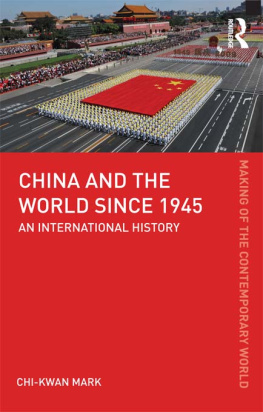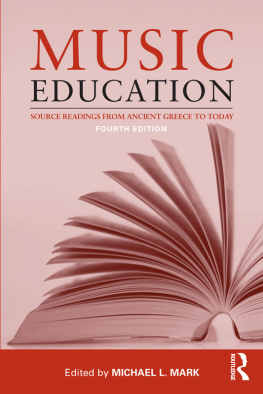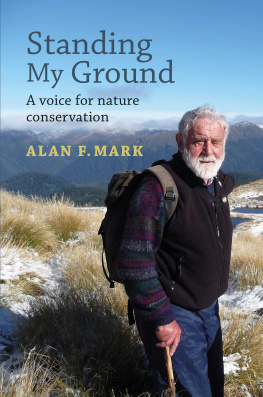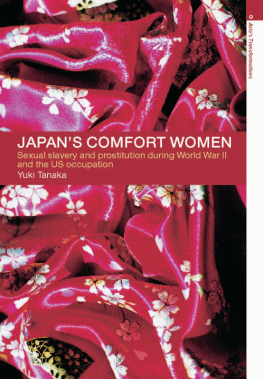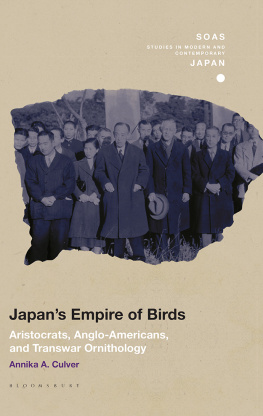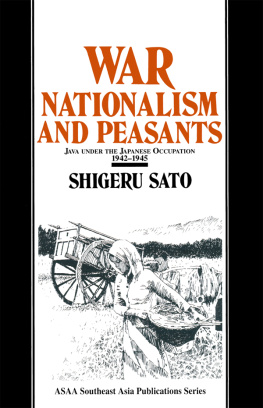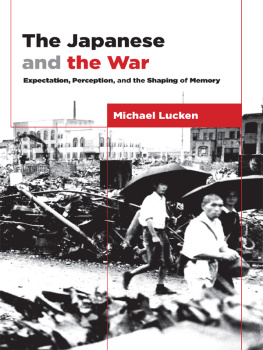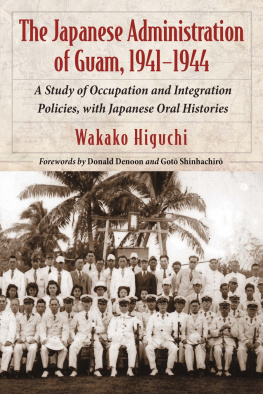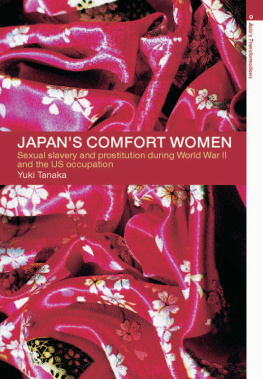Japans Occupation of Java in the
Second World War
SOAS Studies in Modern and Contemporary Japan
Series Editor: Christopher Gerteis, SOAS, University of London (UK)
Series Editorial Board:
Steve Dodd, SOAS, University of London (United Kingdom)
Andrew Gerstle, SOAS, University of London (United Kingdom)
Janet Hunter, London School of Economics and Political Science (United Kingdom)
Helen Macnaughtan, SOAS, University of London (United Kingdom)
Timon Screech, SOAS, University of London (United Kingdom)
Naoko Shimazu, Yale-NUS College (Singapore)
Published in association with the Japan Research Centre at the School of Oriental and African Studies, University of London, UK.
SOAS Studies in Modern and Contemporary Japan features scholarly books on modern and contemporary Japan, showcasing new research monographs as well as translations of scholarship not previously available in English. Its goal is to ensure that current, high-quality research on Japan, its history, politics, and culture, is made available to an English-speaking audience.
Published:
Women and Democracy in Cold War Japan, Jan Bardsley
Christianity and Imperialism in Modern Japan, Emily Anderson
The China Problem in Postwar Japan, Robert Hoppens
Media, Propaganda and Politics in 20th-Century Japan, The Asahi Shimbun Company (translated by Barak Kushner)
Contemporary Sino-Japanese Relations on Screen, Griseldis Kirsch
Debating Otaku in Contemporary Japan, edited by Patrick W. Galbraith, Thiam Huat Kam, and Bjrn-Ole Kamm
Politics and Power in 20th-Century Japan, Mikuriya Takashi and Nakamura Takafusa (translated by Timothy S. George)
Japanese Taiwan, edited by Andrew Morris
Japans Postwar Military and Civil Society, Tomoyuki Sasaki
The History of Japanese Psychology, Brian J. McVeigh
Postwar Emigration to South America from Japan and the Ryukyu Islands, Pedro Iacobelli
The Uses of Literature in Modern Japan, Sari Kawana
Post-Fascist Japan, Laura Hein
Mass Media, Consumerism and National Identity in Postwar Japan, Martyn David Smith
Japans Occupation of Java in the Second World War, Ethan Mark
Forthcoming:
Gathering for Tea in Modern Japan, Taka Oshikiri
Kenkoku University and the Experience of Pan-Asianism, Yuka Hiruma Kishida
Engineering Asia, Hiromi Mizuno, Aaron S. Moore, and John DiMoia
Studies of the Weatherhead East Asian Institute, Columbia University
The Studies of the Weatherhead East Asian Institute of Columbia University were inaugurated in 1962 to bring to a wider public the results of significant new research on modern and contemporary East Asia.
Japans Occupation of Java in the
Second World War
A Transnational History
Ethan Mark

History revels in irony, often saving its sharpest barbs for those most assured of its meaning. Such hubris manifests most profoundly precisely at moments of seismic social shiftmoments of revolutionary upheaval in which history itself seems up for grabs. Now all is action, possibility, change; the pace of time itself seems to quicken. Altered relations of power, real and imagined, encourage the surfacing of accumulated ambitions and grievances, the reimagining and remapping of social boundaries, visions of transcendence. The contradictions of the old are confidently exposed to substantiate the fullness of the new. At their foundations, however, the structures of social power and knowledge and the orders they constitute are not so easily overcome; outflanked, they do not yield the field but rather reconsolidate and renegotiate it. The identity of the self-proclaimed missionaries of the new, how they define the relations of past and present, and the logic by which the new order allows them a social space, highlight not only the promise but also the limits of liberation.
This is a story of the wartime encounter in Java between two modern Asian societies, Japanese and Indonesian, embracing not one but two such moments of seismic social shift. Preceded by the shocks of Pearl Harbor and the fall of Singapore, the first such event came in the first nine days of March 1942: the overturning of Western imperial hegemony in the Netherlands Indies by a Japanese one. The second, even more instantaneous and unheralded, was Japans defeat in August 1945for most of Javas inhabitants, as much a bolt from the blue as the first. The experience of occupied Java between these two defining moments is reflected and refracted through the experiences of two sets of missionaries and their relations with one another: Japanese men of culture mobilized to conduct public relations for the occupying forces, and Indonesians who worked with them for their own purposes. Forged in a moment of overlapping struggle against a common Western enemy, their story illuminates an extraordinary, ambiguous, and ultimately tragic intersection between the waning forces of empire and the rising tide of nationhooda distinctly Asian permutation of a global story of the Second World War era still largely obscured within the nationally-bounded histories integral to the postwar new order.
Researching, writing, and revising this study have led me on a journey of struggle and discovery across more than two decades and numerous national divides. Along the way I have accumulated a lengthy list of people and institutions to whom I owe debts of gratitude. I cannot imagine this project having gotten off the ground, let alone landing smoothly, without the support and advice of Carol Gluck. As teacher, mentor, scholar, and friend, her inspiration, insight, dedication, and enthusiasm have made an inestimable contribution to whatever I have so far achieved, and might achieve in the future. On the Indonesia side, special thanks go to William Frederick for his unsparing generosity with time, ideas, faith, and encouragement.
Preliminary research in Indonesias National Archives and in Cornell Universitys excellent Southeast Asian collection was conducted with a grant from Columbia Universitys East Asian Institute, with support from John Bresnan. Benedict Anderson and Takashi Shiraishi also provided guidance during my early preparation. Subsequent intensive research in Japan was funded with a generous Fulbright / IIE Doctoral Dissertation Research fellowship. For his support in this period I am indebted to Waseda Universitys Got Kenichi. A number of Japanese veterans of the occupation gave freely of their time and memories and provided me with valuable, hard-to-obtain materials, including Izumi Shinjir, Fusayama Takao, Morimoto Takeshi, and above all Nakajima Masachika. Research in Indonesia and the Netherlands was conducted with funding from a Fulbright-Hays Doctoral Dissertation Research Abroad fellowship. Staff at the National Archives in Jakarta and at the Netherlands Institute for War Documentation (NIOD) in Amsterdam were both exceedingly supportive and generous in availing me access to a wide range of source material. Graciously allowing me to interrupt their lives and work for personal interviews, Indonesian informants such as Sudarpo, Jusuf Ronodipuro, Pramoedya Ananta Toer, Pak Tatang, and Ibu Saina made important contributions to the final outcome.
Writing was undertaken with fellowships from the Whiting Foundation and the NIOD, the staff of the latter also patiently providing me with office space and moral support for a time period much longer than my fellowship appointment. Here I must single out Remco Raben in particular for his steadfast encouragement, faith, and assistance as scholar, colleague, and friend. It was the NIOD once again, in equal share with the Isaac Alfred Ailion Foundation for Japanese Studies, that provided indispensable fellowship support to write this book. Complicated by unanticipated publishers word limits, this project ended up taking several years longer than originally planned, and for this my apologies to all whom I have kept waiting. Thanks to editor Emma Goode and series editor Chris Gerteis at Bloomsbury for finally providing me an opportunity to surmount this hurdle. For scholarly inspiration as well as unstinting support and generosity in assisting in the shaping of the book, I am immeasurably indebted to Takashi Fujitani.
Next page

